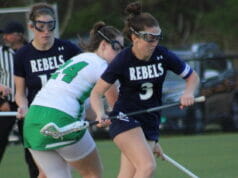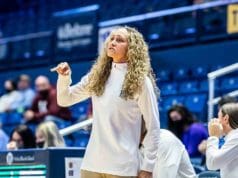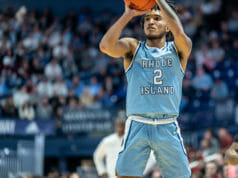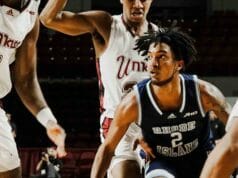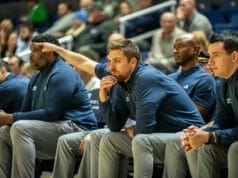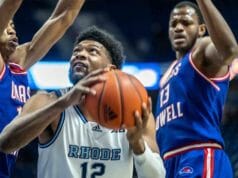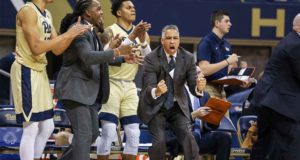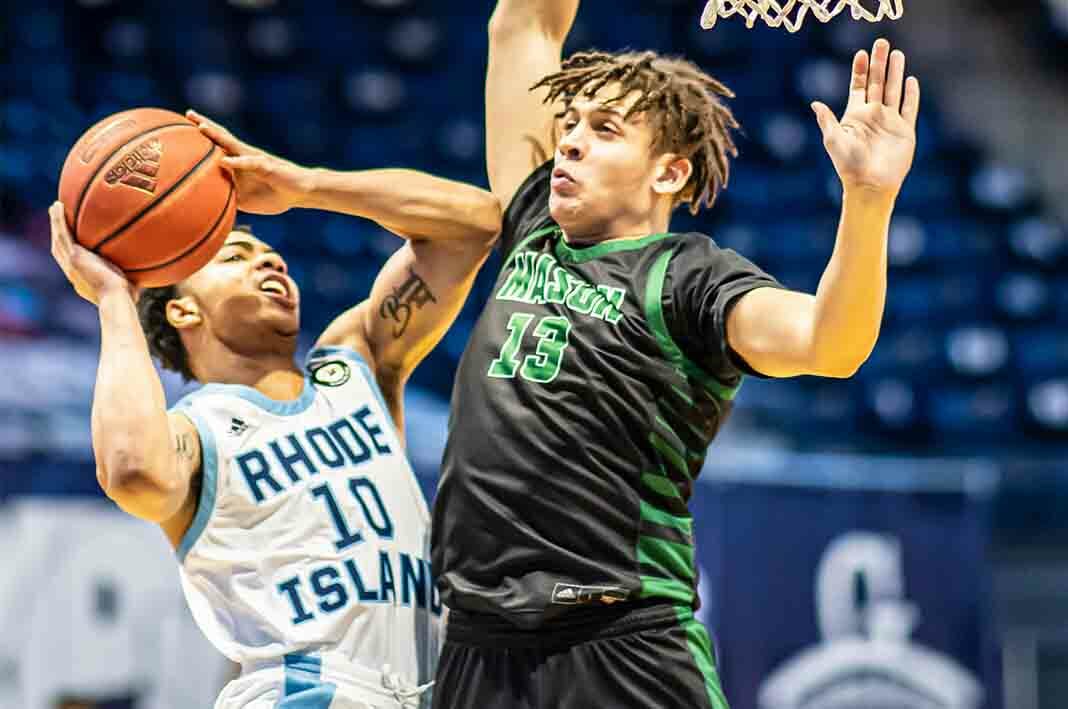
Through 14 games Rhode Island’s 6-2, 180-pound, freshman guard Ishmael Leggett has shown he clearly belongs.
Poised from the moment he stepped on the floor against a Top 25 Arizona State team in November, Leggett brings toughness, a pass-first mentality, and an unwavering commitment to defending.
In a shade under 15 minutes per game, Leggett is averaging 5.2 points, 1.9 rebounds, and about an assist per game while flexing solid shooting percentages across the board: 58.3% FG, 42.9% 3PT, 70% FT – a credit to his decision making and shot selection.
I connected with the personable Leggett for a discussion on his transition to college ball, personal growth, and team aspirations.
Chris DiSano: You came from a great high school league, perhaps the best in the country, in the Washington Catholic Athletic Conference (WCAC). What are your thoughts on the adjustment to the college game?
Ishmael Leggett: Coming from the WCAC which is one of the best conferences in the nation, it definitely prepared me for the physicality and the speed of the college game… and just the pace overall. But it is a whole different level once you get out on the floor in these college games. My first couple of games I got acclimated pretty well and from then on out I’ve become even more used to the pace and physicality.
CDD: What is one pleasant surprise for you in terms of being easier to adjust to… and what is an area that has posed more of a challenge?
IL: Something that is more of a challenge is finishing over bigger defenders. In high school there are some big guys but in college there are many more and finding a way to finish efficiently and effectively at the rim, and involving one-dribble pullups, is something that has been more of a learning process. Something that’s been easier has been conditioning. The WCAC helped me there, getting up and down the floor because most games I played a lot of minutes – and that helped me transition into the up and down aspect of the college game.
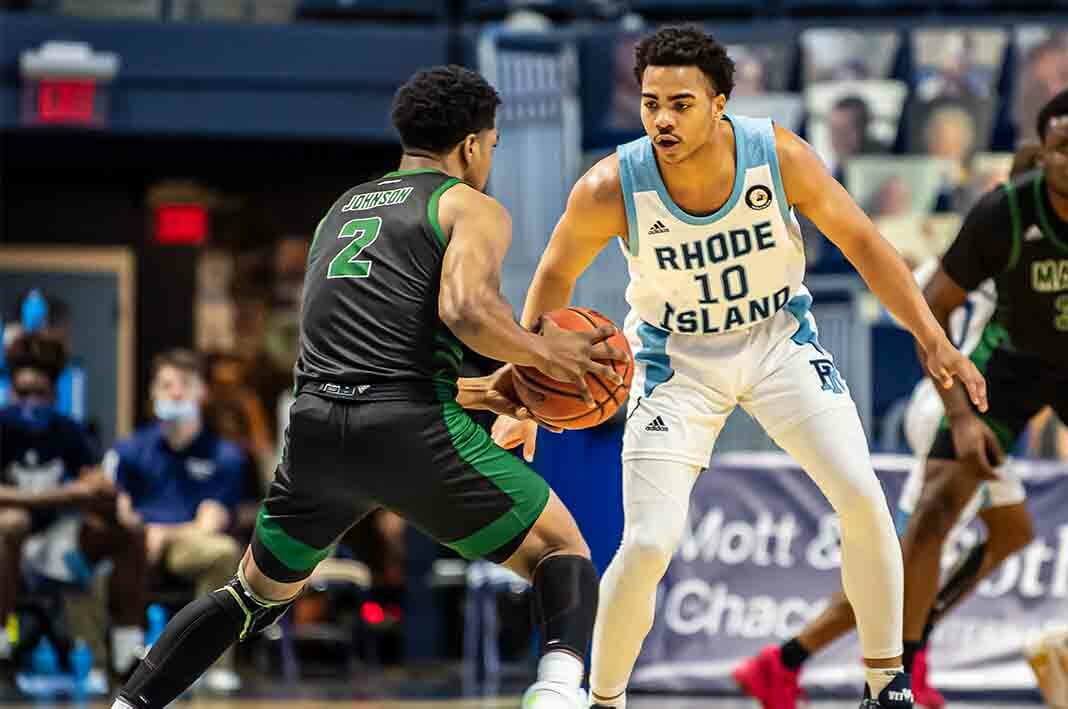
CDD: I was going to get at this later in the interview, but since you brought it up in your last answer let’s drill deeper now. For a young guard you’re an adept finisher around the rim. What do you attribute that to? Is it innate?
IL: I think it’s innate. I don’t run away from contact. A lot of guys are afraid of contact. I seek contact. That’s my game. During high school and the college transition, my game hasn’t changed so the physicality is all the same – taking bumps, I’m used to it. Getting into people’s bodies and finishing – I’m used to it. I’ve always done it.
CDD: When we spoke upon your commitment last year you knew some of the guys but now you’re battling alongside them. What upperclassman has taught you the most so far?
IL: To be honest I take things from all of them. I can go down the line and tell you which part of their game I try to work on myself. But in starting with point guards, Fatts (Russell) and Shep (Jeremy Sheppard) are two senior leaders for sure. They’ve taught me how to slow down, control the pace, attack gaps and things of that nature. And just their work ethic. It’s out of this world. They push me to be better, challenge me every day to get in the gym, stay active, and stay ready so I won’t have to get ready. I strive to model that.
CDD: You are 14 games in now including several conference games. What are you pleased with personally about your game – and what are areas of emphasis to improve.
IL: I want to continue slowing down, learning the game, watching more film – the coaches’ aspect of the game. I’m pleased with how comfortable I’ve become on the court and that allows me to be more aggressive and let my voice be heard. When you work as hard as I do, you know you’re built for these moments and nothing can phase you when you put in the work.
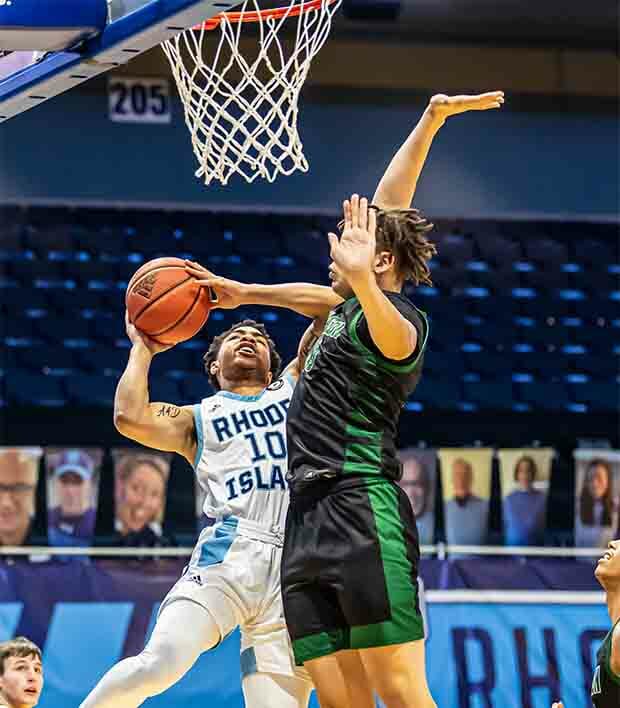
CDD: We’re in the heart of the Atlantic 10 season. Can you sense the difference in conference play?
IL: You can definitely sense a difference. Any given night, an A-10 opponent can come out hot and your whole perspective on the game can change. Anybody can beat anyone. We go into each game trying to get a win. Having the ‘next play’ mentality and winning mindset.
CDD: What have you learned about Coach Cox that you appreciate more now being around him all the time?
IL: (Coach Cox is) more than a Coach. I consider him family. He’s our mentor, coach, life guidance counselor, and you wouldn’t know that until you’re around him as much as I am… as much as our team is. He really has our best interests at heart and wants us to excel in basketball and off the court. He really cares.
CDD: Is there a small example you can share?
IL: He’s always checking in individually to see how we’re doing, how our mental health is… where our head is at with grades, on the court and more. The constant check ups are not something he has to do, making sure that besides basketball – we’re in a healthy mindset.
CDD: Shifting to on the court, you guys are trying to mesh many new pieces. How do you feel the team is coming along?
IL: Considering how many new faces we have I think we’re meshing pretty well. Our chemistry is starting to get there. For example, if I drive now my teammates have an idea of what I might do and that will help them make their next move. We’ll continue to only get better.
CDD: When we talked before you committed you discussed your game. Sometimes guys will say their game is “X” but it isn’t quite “X”. Your self-awareness and description of your game being about defense, toughness, and energy was spot-on. How challenging is it generating energy in these arenas during these times?
IL: It’s player-led. It’s always been player-led but now more than ever given that there are no fans. Our energy has to come from the people on the court and the people on the bench. It’s huge. When I get in the game I try to provide energy – maybe we go on a run, get a steal, hype up the bench. It helps us and that will result in more wins.
CDD: Let’s wrap it here — The team is 7-7, 4-3. What do you, collectively, need to do to get to that next level?
IL: We have to continue to mesh on and off the court. Overall, it’s the little things. Locking in on scout, locking in on defensive assignments, knowing where to be on offensive plays – if we tighten up these little screws I think we’ll have a great chance to be Atlantic 10 champions.
Chris DiSano, is an Atlantic 10 analyst and writer. He has served as the host of A-10 Live! at Men’s Basketball Media Day and founded the former College Chalktalk. DiSano, who was named an NBC Sports top Atlantic 10 basketball follow, can be found on Twitter at @CDiSano44



